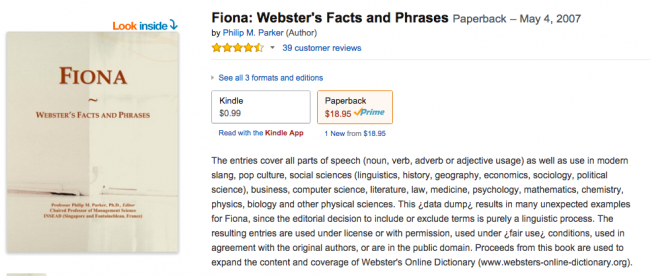The World’s Most Prolific Author

Over the course of his writing career, Mark Twain produced dozens of published works — eleven novels, including one published posthumously; more than 25 short stories; a bunch of essays and works of non-fiction; and more. By any measure, he was a prolific author.
Unless you measure him against a guy you’ve probably never heard of.
Phillip M. Parker is a professor of Management Sciences at INSEAD, a multi-national business school. As you’d expect from someone with such a title, he holds a lot of relevant degrees — a PhD in business economics; a pair of masters of business administration with different focuses; and undergrad degrees in math, economics, and for good measure, biology. It’s a resume befitting his job, the biology degree notwithstanding, and not one you’d imagine leading to fame and, perhaps, fortune in writing books.
Yet he’s written a lot of them — at least 100,000 different titles. The number is twice that if you ask him, but let’s go with Amazon’s number:

Parker was born in 1960. Assuming he was writing all day, every day, from the moment he was born until about now, he’d have to have written more than six books a day to hit 107,326. That’s a lot of writing, to say the least, especially for someone whose resume doesn’t suggest he’s taken a single literature course.
But Parker has something else on his resume — a patent. Specifically, it’s this one, for an “the automatic authoring, marketing, and/or distributing of title material” in which “a computer automatically authors [books].” Basically, he developed software which can turn out a book in short order, all done by computer and with no writing on his end. He first filed the patent application in November of 2000, which at the time made it only a passing curiosity. But with ebooks and print-on-demand services now available, it’s, well, still a passing curiosity, but one which can create a commercial product on the fly.
None of the titles are at the level of Huck Finn or Tom Sawyer (or even The Celebrated Jumping Frog of Calaveras County). They’re an odd mix of bilingual dictionaries such as “Webster’s Icelandic-English Thesaurus Dictionary” and bilingual crossword puzzle collections; medical guidebooks like “The Official Patient’s Sourcebook on Sarcoidosis;” and hyper-specific commercial treatises such as the exceptionally titled (and at $495, ridiculously expensive) “The 2007-2012 Outlook for Bathroom Toilet Brushes and Holders in Greater China.” He also has a collection of books which simply cite to public domain or similar uses of a specified word, for example, ingress.
It’s unclear if Parker has broken the bank with his tens of thousands of books; a 2008 profile of him in the New York Times is probably the most thorough write-up of his writings, but fails to address how commercially successful they’ve been (if at all). But there is something Parker has broken: Amazon. If you go to his book titled “Fiona: Webster’s Facts and Phrases,” you’ll note that it has 39 reviews, which is a lot for a book about literally nothing. Read the reviews, though, and you’ll see references to “everlasting love,” characters that “actually come alive,” and a storyline which is “absorbing and entertaining” — all high praise for a computer-generated non-story. That’s because Amazon’s algorithms somehow confused Phillip M. Parker’s “Fiona” with a romance novel, one also titled “Fiona,” but by P.L. Parker. (Here are some screenshots if you want to compare.) Apparently, if you auto-generate 100,000 or more books, Amazon can’t quite handle it.
 Bonus Fact: Phillip M. Parker’s works are all junk non-fiction, but if he ever cracks fiction, he should probably move to Norway. As the New Republic notes, “so long as a new Norwegian [fiction] book passes quality control, Arts Council Norway purchases 1,000 copies of it to distribute to libraries—or 1,550 copies if it’s a children’s book.” (That’s on top of the libraries’ regular budgets, too.) At about four books written a day and a $1 royalty each, Parker would have himself a $1.4 million a year job.
Bonus Fact: Phillip M. Parker’s works are all junk non-fiction, but if he ever cracks fiction, he should probably move to Norway. As the New Republic notes, “so long as a new Norwegian [fiction] book passes quality control, Arts Council Norway purchases 1,000 copies of it to distribute to libraries—or 1,550 copies if it’s a children’s book.” (That’s on top of the libraries’ regular budgets, too.) At about four books written a day and a $1 royalty each, Parker would have himself a $1.4 million a year job.
From the Archives: The Making of a Million-Dollar Fly: How warring computer programs made for some very expensive books.
Take the Quiz: Name the authors of 30 famous books — in 60 seconds or less. The time limit make this pretty hard.
Related: “The 2007-2012 Outlook for Bathroom Toilet Brushes and Holders in Greater China.”
